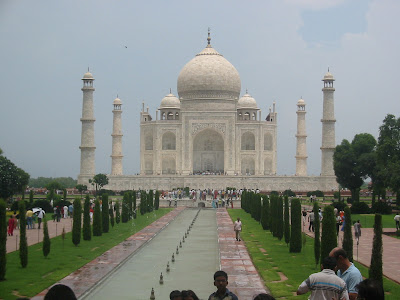It cost me an arm and a leg, because I had to hire a private car to drive me. I had wanted to take the Taj Express - a train - to and from Agra, but the return train would have gotten me to Delhi at 10pm, too late to make it to the airport for my flight that night at 1am.
The driver, Vijay, picked me up at the hotel and we drove the 4 hours to Agra. I had heard horror stories from several people about the road to Agra that I won't repeat here, but strangely, I missed all of the grossness. I don't know why; it sounded unmissable. But the drive was unremarkable except for the lack of AC in the car (Vijay claimed it was broken, but somehow miraculously it worked when we had to shut the windows for the torrential rain).
Vijay stopped at a restaurant for a bathroom break. This restaurant had a huge gift shop area that I wasn't interested in, but when I came out of the bathroom, I couldn't find him anywhere. I waited, wandered, avoided the souvenier shop men, and waited more. After 3 attempts to find him, he reappeared. Hmm.
When we got to Agra, Vijay kept stopping at places that he thought I would want to take pictures of, mostly random temples, but I had had enough of temples and I didn't really feel like taking photos from the road anyway. At another temple, he offered to stop so I could go in, but it was pouring out so I didn't feel like getting out of the car. After a hot and windy 4 hour drive, I just wanted to see the Taj already. I don't think I was his typical tourist.
As we approached, he kept making phone calls to his "friend from the company." I finally figured out that this was supposed to be a tour guide. He said it was free, and "if you like, you tip, if you don't like, no tip." I explained that I really didn't need a tour guide (and I don't feel like spending more money). He didn't seem to get it (or want to) and kept calling the guy. His English was minimal, so I gave up after a few tries and figured I would wait and see what was really going on.
Finally we pulled up to the corner, and a man got in. He spoke excellent English, and he explained that he was the "free" tour guide. (Given that tour guides stand outside the Taj and offer their services for 50-150 rupees, I'm guessing that they figure that a tourist will probably tip at least 200 rupees and so they make more money that way.) I'm sure I would have learned and appreciated more with a tour guide, and that there is probably tons to say about the Taj Mahal. But all I could picture was this guy blathering on condescendingly while i schvitzed and wished I could just sit down and relax. So I explained it again and after insisting politely but firmly another few times, they gave up.
The Taj Mahal was beautiful. It is basically a huge, symmetrical structure built of white marble.

It was built by a Mughal Emperor for his wife, Mumtaz Mahal, after she died giving birth to their fourteenth child. The obstetrician in me perked up - hmmm, postpartum hemorrhage? Although it was beautiful, I can't say it resonated with me. It was kind of simple, and just one structure. I don't know what I expected, maybe more detail or more buildings or something. I made several passes through to see what I had missed, and I did notice a couple of details, like the jewels on the tombstones inside. But then I had to run away because some large mouth-breather man kept stalking me, imitating me when I looked at things, trying to talk to me and mushing up against me in the crowd.
What I actually enjoyed more than the Taj was the Agra Fort, or the Red Fort, so named because it is made out of red sandstone.

Vijay wanted to take me to some souvenier shop in Agra, and I had to again tell him several times that I was not interested. I wanted to go to the fort instead. Then of course he got all huffy about the time and traffic for the return trip, and told me I had only 45 minutes. Whatever.
The Agra fort was huge and spectacular. It is not nearly as well cared for as the Taj Mahal, but if it was I think it would be truly stunning. There are several buildings, but they are all interconnected by stairways, hallways, nooks and crannies. There is some fantastic detail on the walls, ceilings and gates. I could have wandered around for hours. I could easily imagine the place in its heyday, lavishly decorated with furniture, artwork and jeweled textiles with royalty in magnificent saris and kurtas and tubans milling about.







After the Agra fort, it was a 5-hour drive back to the Delhi airport for my 14-hour flight home.



















